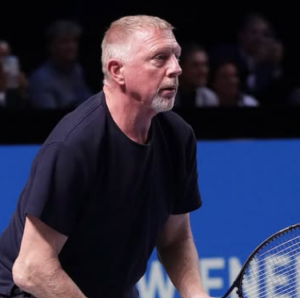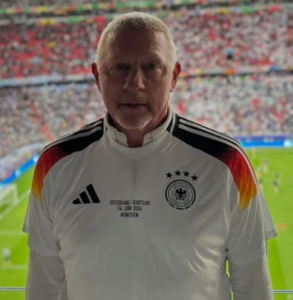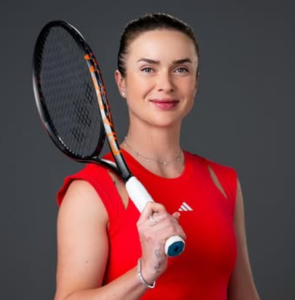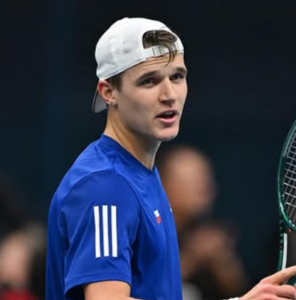The debate sparked by Tennis TV’s youngest ATP finalists list highlights a broader issue in the tennis world: the need for a more inclusive view of the sport’s history
While it’s natural to celebrate the achievements of modern players, it’s equally important to recognize the contributions of those who came before them.
Players like Boris Becker, Martina Navratilova, and Chris Evert are integral to tennis history, and their achievements should not be diminished by a limited, modern perspective.
Ultimately, tennis is a sport built on tradition, and tradition includes honoring the players who paved the way for future generations.
By ensuring that the accomplishments of all eras are celebrated, we can continue to enjoy the rich history of tennis and honor the legacies of its greatest champions.
Martina Navratilova and Boris Becker are two of the most iconic figures in tennis, and their achievements as teenage prodigies helped to shape the modern game. Their early triumphs were not just about breaking records—they were about showing the world that age was no obstacle to greatness.
Their stories continue to inspire young athletes today and serve as a reminder that with hard work, determination, and an unwavering passion for the sport, anyone can achieve greatness.

Also Read: Kim Clijsters’ Sweet Memory of Meeting a German Tennis Icon at Wimbledon
Table of Contents
Boris Becker: Controversy Surrounding Tennis TV’s Youngest ATP Finalists List
Martina Navratilova, one of the greatest tennis players in history, is no stranger to debate and controversy in the sport.1
The 18-time Major singles champion recently voiced her opinion on an issue surrounding a list published by Tennis TV.
This list, which aimed to highlight the youngest ATP finalists, sparked a heated conversation not only among tennis fans but also among some of the sport’s most legendary players, including Navratilova herself.
In this article, we will delve into the controversy that arose when Tennis TV released its list of the youngest ATP finalists, focusing on the criticism it garnered from pre-2000 tennis stars.
Additionally, we will explore the reasons behind their objections and the broader implications this debate has for the way we view tennis history.
Amazing picture https://t.co/deH4G4gZAd
— Boris Becker (@TheBorisBecker) February 17, 2025
The List: Tennis TV’s Youngest ATP Finalists
The list published by Tennis TV on social media was a response to Brazilian teenager Joao Fonseca’s victory at the Argentina Open.
At just 18 years old, Fonseca claimed his first ATP tour title by defeating fifth-seed Francisco Cerundolo 6-4, 7-6(1) in the final. His win placed him in the tenth spot on the list of the youngest ATP finalists.
The list, however, only included players who reached ATP finals from 2000 onwards, effectively excluding many notable players from previous decades. Rafael Nadal topped the list, having won his first ATP title at the age of 15 in Mallorca.
The list was a celebration of the young players of the modern era but sparked controversy among tennis veterans who felt left out by the narrow criteria.

Boris Becker’s Outspoken View
Boris Becker, a six-time Major singles champion and one of the sport’s most iconic figures, was one of the first to question Tennis TV’s decision to limit the list to players from 2000 onward.2
Becker, who retired in 1999, was notably absent from the list despite achieving incredible success as a teenager in the 1980s and 1990s.
Becker took to social media to express his dissatisfaction with the list, pointing out that his achievements—and the accomplishments of other pre-2000 players—deserved to be recognized.
His post was a simple but pointed question: “What about me?” This question resonated with many fans and tennis players who felt that the history of the sport was being overlooked by the list’s restrictive timeline.
Martina Navratilova Joins the Debate
Martina Navratilova, a contemporary of Becker and one of the most decorated female tennis players in history, also voiced her opinion on the matter.
Known for her candid views on tennis and the sport’s history, Navratilova responded with a brief but impactful statement: “Apparently not.”
This response, though succinct, captured the sentiment of many players and fans who felt that Tennis TV’s list was an incomplete representation of the sport’s history. For Navratilova, whose career spanned from the 1970s to the 1990s, the omission of pre-2000 players like Becker and herself was a slight to their contributions to tennis.
Chris Evert’s Perspective: A Champion of the Past
Chris Evert, another tennis legend who was a contemporary of Navratilova, also chimed in on the debate. Evert, a former rival of Navratilova, took to social media to share her thoughts on the issue.
Evert emphasized that tennis players from her era did their best with the limited technology and training resources available at the time.
In her statement, Evert highlighted the fact that players like herself and Navratilova competed with wooden rackets, which posed unique challenges compared to the advanced technology available to modern players.
She remarked, “We did the best with the information, technology (wood rackets!) training that was out there. We were champions in our era.
Enough said!!!” Evert’s words underscored the importance of acknowledging the accomplishments of players from earlier eras and the context in which they achieved success.

Boris Becker: Why Pre-2000 Players Deserve Recognition?
- One of the central arguments put forth by players like Becker, Navratilova, and Evert is that tennis history should not be viewed through a narrow, modern lens.3
- By excluding pre-2000 players from the list of youngest ATP finalists, Tennis TV effectively downplays the significance of their accomplishments.
- These players achieved great success in an era when the game was fundamentally different, and they laid the foundation for many of the developments in tennis that would follow.
- For example, Becker became the youngest player to win Wimbledon at the age of 17 in 1985. Similarly, Navratilova dominated the women’s game, winning 18 Grand Slam singles titles, including a record nine Wimbledon titles.
- Their achievements were groundbreaking at the time, and their impact on the sport cannot be understated.
- The exclusion of these players from a list celebrating young talent is not just a matter of historical accuracy but also an issue of respect.
- It’s important to recognize that players from the 1980s and 1990s played a significant role in shaping the game we know today.
- They faced challenges that modern players have not had to contend with, and their resilience and talent deserve acknowledgment.

Tennis TV’s Response: Is the Timeline Justified?
While the criticism from Becker, Navratilova, and Evert is valid, it’s important to understand why Tennis TV chose to limit its list to players from 2000 onwards.
The rationale behind this decision is likely a reflection of the evolution of tennis over the past two decades. The sport has seen significant changes in terms of player development, technology, and the global expansion of the ATP tour.
The advent of new racket technologies, improved fitness regimes, and better coaching methods has undoubtedly had an impact on the level of competition in the ATP. Players in the modern era are generally stronger, faster, and more physically prepared than their predecessors.
Therefore, Tennis TV may have believed that a focus on recent players would highlight the ongoing growth and development of the sport.
Furthermore, players like Nadal, who won his first ATP title at 15, represent a new generation of tennis stars who have emerged in the wake of the dominance of older players like Pete Sampras and Andre Agassi.
These younger players are breaking records and setting new benchmarks for success in tennis, and it is only natural that Tennis TV would want to celebrate this new wave of talent.

Also Read: Who is Sharlely Kerssenberg wife of Boris Becker, her Bio, Career, Net worth 2023 and More





